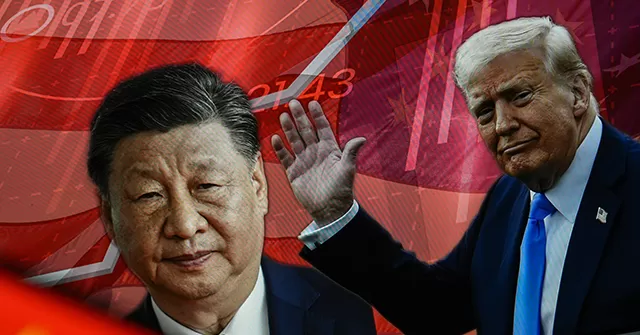In recent years, China has emerged as a global superpower, with its economic and political influence reaching far and wide. However, there is one man who sees something that most of the establishment media will not concede – President Donald Trump. Despite facing constant criticism and backlash from the media, Trump has been vocal about his views on China and its vulnerabilities. And as the world continues to grapple with the ongoing pandemic, it is becoming increasingly clear that Trump’s insights on China were spot on.
The mainstream media has often portrayed China as an unstoppable force, with an economy that is growing at an unprecedented rate. However, Trump has been quick to point out that this growth is not sustainable and that China is, in fact, more vulnerable than people tend to think. This is a view that has been echoed by many experts and analysts, but it is one that the media has been reluctant to acknowledge.
One of the main reasons for China’s vulnerability is its heavy reliance on exports. The country’s economy is heavily dependent on exports, with a significant portion of its GDP coming from trade. This has made China highly susceptible to external shocks, such as the ongoing trade war with the United States and the current pandemic. As the world’s largest exporter, China’s economy has taken a massive hit due to the disruption in global supply chains and the decrease in demand for its products.
Moreover, China’s economic growth has been fueled by massive amounts of debt. The country’s debt-to-GDP ratio has been steadily increasing, and it currently stands at over 300%. This level of debt is unsustainable and poses a significant risk to China’s economy. As the world continues to grapple with the economic fallout of the pandemic, China’s debt burden is only going to increase, making it even more vulnerable.
Another factor that makes China vulnerable is its aging population. The one-child policy, which was in place for decades, has resulted in a rapidly aging population. This has put a strain on the country’s social security system and has led to a shrinking workforce. As a result, China’s economic growth is expected to slow down significantly in the coming years, making it even more vulnerable to external shocks.
But perhaps the most significant vulnerability that China faces is its authoritarian regime. The Chinese Communist Party (CCP) has a tight grip on the country, and any dissent or criticism is swiftly silenced. This has led to a lack of transparency and accountability, which has been evident in the handling of the current pandemic. The CCP’s initial cover-up of the virus and its mishandling of the situation has not only caused a global health crisis but has also damaged China’s reputation and credibility.
Despite these vulnerabilities, the mainstream media has been reluctant to acknowledge them. Instead, they have chosen to focus on China’s economic growth and its rising global influence. But Trump has been quick to point out these vulnerabilities and has taken a tough stance against China, imposing tariffs and calling for a more balanced trade relationship. And as the world continues to grapple with the economic fallout of the pandemic, it is becoming increasingly clear that Trump’s approach was the right one.
In conclusion, Trump’s insights on China’s vulnerabilities have been proven right, and it is time for the media to acknowledge this. China’s heavy reliance on exports, massive debt burden, aging population, and authoritarian regime make it highly vulnerable to external shocks. And as the world continues to navigate through these uncertain times, it is essential to recognize these vulnerabilities and take a more balanced approach towards China. Trump’s stance on China may have been met with criticism, but it is one that is based on a deep understanding of the country’s vulnerabilities. And as we move forward, it is crucial to keep these vulnerabilities in mind and work towards a more stable and balanced global economy.










